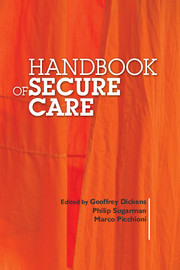Book contents
- Frontmatter
- Contents
- List of tables, boxes and figures
- List of contributors
- Preface
- 1 The evolution of secure and forensic mental healthcare
- 2 Mental disorder and offending
- 3 Clinical risk assessment in secure care
- 4 Risk management in secure care
- 5 Recovery in secure environments
- 6 Personality disorder
- 7 Women's mental health, aggression and offending
- 8 Offenders with intellectual disability in secure services and the criminal justice system
- 9 Secure mental healthcare for young people
- 10 Secure care for people with autism spectrum disorder
- 11 Acquired brain injury, trauma and aggression
- 12 Managing aggression and violence in older people
- 13 Firesetting in secure settings: theory, treatment and management
- 14 Specialist psychological treatment programmes in secure mental healthcare
- 15 Nursing in secure mental healthcare settings
- 16 Prescribing for specialist populations
- 17 Human rights in secure psychiatric care
- 18 Quality assurance and clinical audit in secure psychiatric care
- 19 Psychological support following violent assault and trauma: what works for staff in secure settings?
- Index
17 - Human rights in secure psychiatric care
Published online by Cambridge University Press: 02 January 2018
- Frontmatter
- Contents
- List of tables, boxes and figures
- List of contributors
- Preface
- 1 The evolution of secure and forensic mental healthcare
- 2 Mental disorder and offending
- 3 Clinical risk assessment in secure care
- 4 Risk management in secure care
- 5 Recovery in secure environments
- 6 Personality disorder
- 7 Women's mental health, aggression and offending
- 8 Offenders with intellectual disability in secure services and the criminal justice system
- 9 Secure mental healthcare for young people
- 10 Secure care for people with autism spectrum disorder
- 11 Acquired brain injury, trauma and aggression
- 12 Managing aggression and violence in older people
- 13 Firesetting in secure settings: theory, treatment and management
- 14 Specialist psychological treatment programmes in secure mental healthcare
- 15 Nursing in secure mental healthcare settings
- 16 Prescribing for specialist populations
- 17 Human rights in secure psychiatric care
- 18 Quality assurance and clinical audit in secure psychiatric care
- 19 Psychological support following violent assault and trauma: what works for staff in secure settings?
- Index
Summary
Introduction
In recent years human rights have become increasingly relevant to all areas of public life. People with mental illness who pose a risk to others are among the most vulnerable members of our society, and special attention must be paid to protecting their rights. At the same time their rights often require careful balancing with the rights of others who may be adversely affected by their behaviour. This chapter introduces the European Convention on Human Rights and the associated Human Rights Act 1998, which enacts the Convention in UK law. It then focuses on the articles of the Convention most relevant to mental health practice, particularly in secure psychiatric care, and identifies the implications for clinicians.
The European Convention on Human Rights
The United Nations (UN) was formed in October 1945 and in 1948 its Universal Declaration of Human Rights was adopted by member states, partly as an attempt to protect against a repetition of the atrocities of World War II. The Council of Europe, founded in 1949, was also formed with this aim in mind, and its European Convention on Human Rights and Fundamental Freedoms came into force the following year. The other major contemporary influence on the Convention was the considerable anxiety of Western European leaders about the spread of communism across Eastern Europe. Articles 1 to 14 of the Convention are presented in Box 17.1, with those most relevant to mental health practice in bold.
Initially, two separate entities ensured that the Convention was followed, the European Commission of Human Rights and the European Court of Human Rights, but since 1999 the Court alone has ruled on Convention violations. Currently, 47 states are contracting parties to the Convention, including many of the post-communist Eastern European countries.
Box 17.1 Articles 1–14 of the European Convention on Human Rights, with those most relevant to mental health practice highlighted
1 The High Contracting Parties are obliged to secure to everyone within their jurisdiction the following rights:
2 the right to life;
3 freedom from torture;
4 freedom from slavery;
5 the right to liberty;
6 the right to a fair trial;
7 freedom from retrospective criminal law;
8 the right to respect for private and family life;
9 freedom of thought, conscience and religion;
10 freedom of expression;
- Type
- Chapter
- Information
- Handbook of Secure Care , pp. 269 - 286Publisher: Royal College of PsychiatristsPrint publication year: 2015



